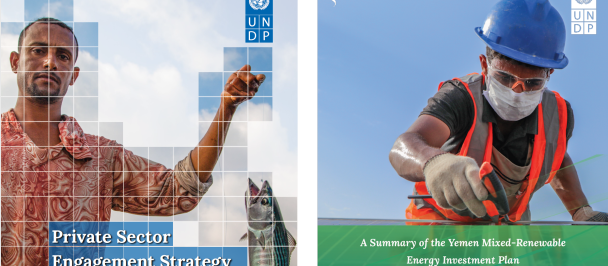Unlocking opportunities: private sector engagement in Libya
October 9, 2024

Tripoli —The United Nations Development Programme (UNDP), in collaboration with the Ministry of Local Government and with funding from the European Union's Trust Fund for Africa, the Government of the Republic of Korea, and the UN Peacebuilding Fund, held a high-level strategic meeting to discuss challenges and opportunities for private sector development in Libya.
The event, part of a broader initiative to engage the private sector, featured the results of a comprehensive mapping of over 1,000 Libyan companies through online campaigns, interviews, and consultations with business leaders. The process identified and mapped medium and large businesses across key sectors, such as real estate, construction, the energy supply chain—including oil and gas—and value-added manufacturing services.
The one-day workshop welcomed participants from across the private sector to exchange knowledge, share global best practices, and explore innovative strategies that can be applied in Libya. Guided by the country’s Vision 2040, which prioritizes economic diversification and private sector growth, the workshop highlighted Libya’s need to enhance capacities and governance practices while reducing public-private competition and boosting non-oil investments. The Peacebuilding Vision 2040 strategy emphasizes key sectors such as agriculture, finance, tourism, economic free zones, cross-border transit trade, development of small and medium-sized enterprises, petrochemicals, marine resources, and renewables.
In her opening remarks, Dr. Sophie Kemkhadze, UNDP Resident Representative in Libya, stated, "While Libya has natural resources, a young and talented population, and an entrepreneurial spirit, the country faces specific economic and business landscape challenges, but there’s great potential to unlock through targeted support and capacity building.” Dr. Kemkhadze emphasized that today’s consultations provide an opportunity to unpack these challenges, learn from global case studies, and explore what is possible as we work together to identify tangible solutions for effective private sector engagement in Libya." The Minister of Local Government also underscored the significance of engaging the private sector in line with the country's broader economic reform agenda.
Dr. Kemkhadze reiterated UNDP’s commitment to advancing economic development as an integral component of the peacebuilding and resilience agenda and thanked the European Union, the Embassy of the Republic of Korea, and the UN Peacebuilding Fund for their continued support and partnership.
During the panel discussions, key government authorities and the international community representatives further reiterated the importance of collaboration and concrete commitment. H.E Nicola Orlando, the European Union Ambassador to Libya, said, "There is a significant potential for entrepreneurship, and I believe the private sector's potential in Libya is unparalleled". Adding that " the EU encourages the Libyan government to foster an entrepreneurial environment that involves women and youth, especially in the south, in development efforts, as Libya's population is relatively small, and everyone must be involved."
Background
Since 2017, UNDP has supported national and local institutions in their efforts to promote resilience and peacebuilding across Libya by fostering inclusive economic recovery and social cohesion strategies. At the municipal level, UNDP assists local authorities in conflict prevention and ensuring that interventions 'do no harm' and contribute to peaceful coexistence. In partnership with the Prime Minister’s Office, the Ministry of Local Government, the Ministry of Planning, and other line ministries and local authorities, UNDP promotes stabilization, resilience, local peacebuilding, and local economic recovery alongside fostering accountable and inclusive governance systems in 65 municipalities across the country, benefiting more than 5 million people.
For more information or media interviews, please contact: media.ly@undp.org

 Locations
Locations



